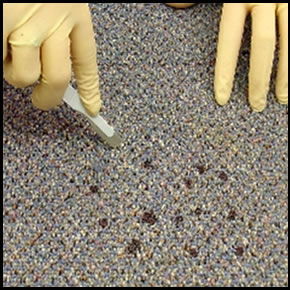- 1: Types of Evidence
- 2: Types of Crime Scenes
- 3: Evidence Collection
- Collection Priority
- Control Samples
- Reference Sample Collection
- Equipment
- Procedures
- Biological Evidence Packaging
- Blood and Body Fluid Collection
- Hair and Fiber
- Wet Stains on Absorbent Surfaces
- Special Situations
- Wet Stains on Nonabsorbent Surfaces
- Dry Stains on Absorbent Surfaces
- Dry Stains on Nonabsorbent Surfaces
- Collecting a Sample From a Smear
- Evidence Marking
- Packaging for Transport
- Chain of Custody
- Preserving Evidence
- Reporting
- Testifying
- Summary
- 04: CODIS

Blood and Body Fluid Collection
Home > 3. Evidence Collection > Blood and Body Fluid Collection
The most common methods used to collect blood and body fluid evidence include the following:
- Cuttings. Remove a section of the item containing the stain using a sterile or clean cutting device.

Image courtesy of Kansas Bureau of Investigation
Removing a section of carpet containing a stain using a sterile cutting device- Wet absorption. A sterile swab, gauze pad or threads slightly moistened with distilled water. Concentrate the stain in a localized portion of the swab or pad. When a swab is used, the stain should be concentrated on the tip. The collection medium is pressed or rubbed into the stain and allowed to air-dry. Some laboratories recommend following the first moistened swabbing with a second dry swabbing to ensure thorough sample collection. Both swabs are retained and submitted for analysis.
- Scraping method. The sample is scraped with a clean razor blade or scalpel, into a clean piece of paper that can be folded and packaged in a paper envelope. This is a method to be used in a controlled environment (i.e., no wind or traffic) and where the scrapings will not contaminate other evidence.

Click here to open and save a double-sided printable version of bindle paper. (PDF) Adobe Acrobat Reader Required

Click here for a video demonstration of scraping dried blood into bindle paper.
- Tape-Lifting method. An optional method for collecting dried blood stains on a nonabsorbent surface is using fingerprint tape. The fingerprint-lifting tape may be placed over the stain and lifted off. The stain is transferred to the adhesive side of the tape, which may then be secured on a clear piece of acetate for submission to the laboratory. Note: When using this method, the collector must ensure the fingerprint tape is not contaminated with other biological materials.



